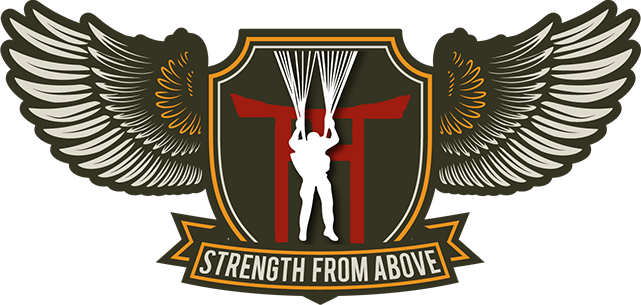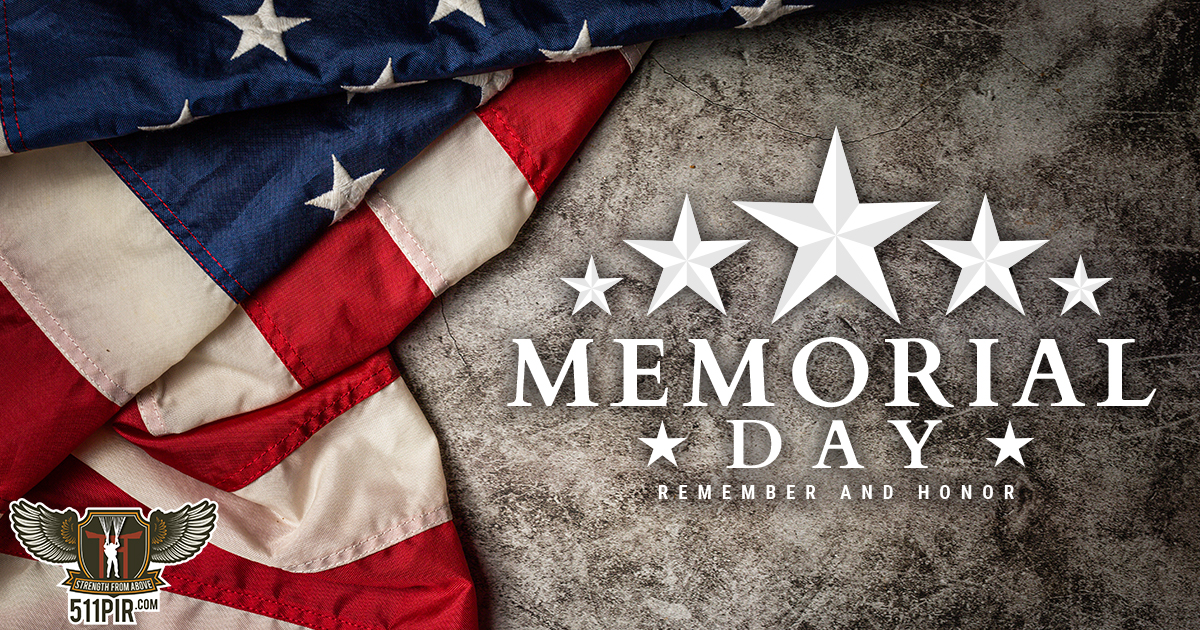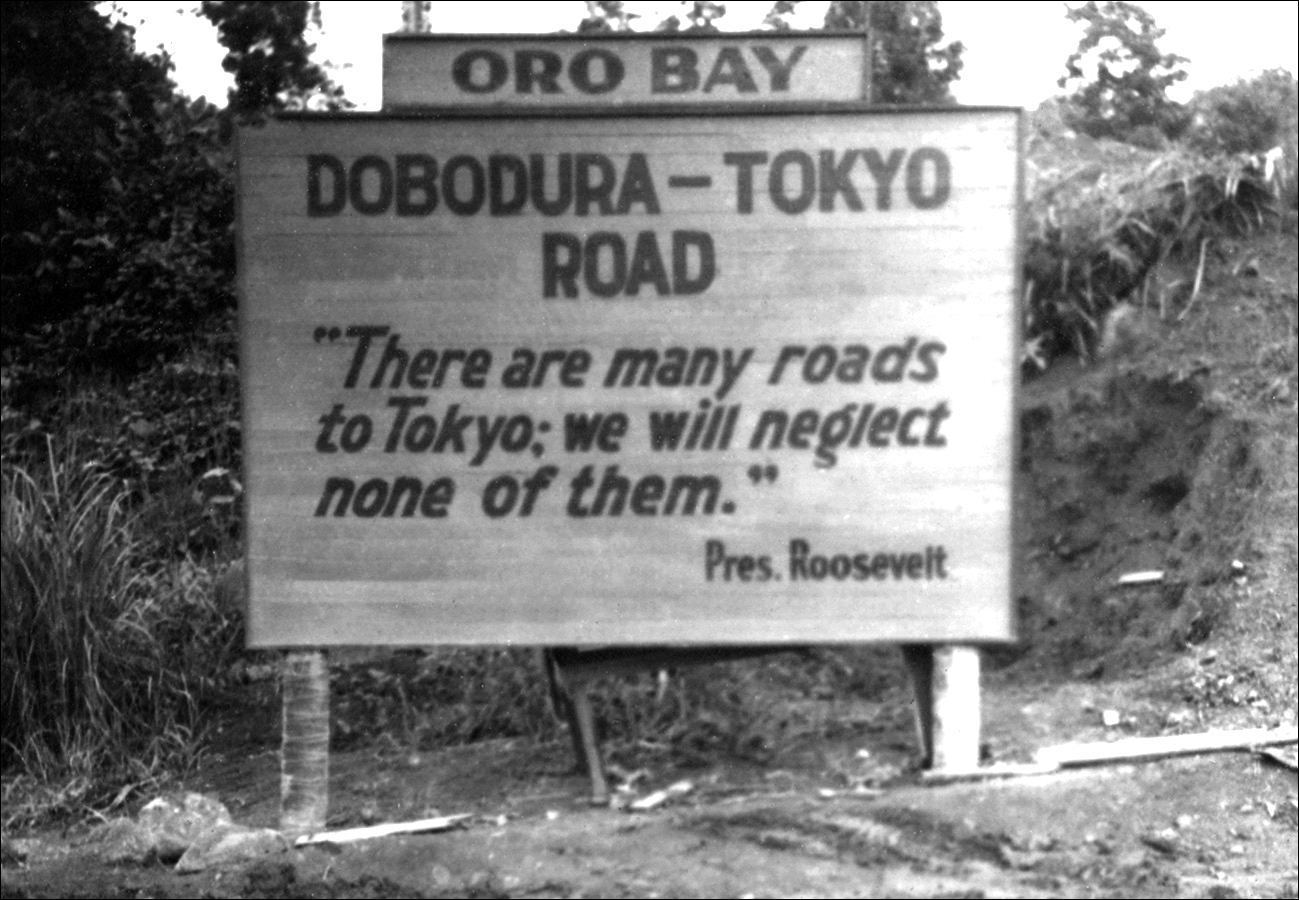 I've received several inquiries lately about what Colonel Orin D. "Hard Rock" Haugen's 511th Parachute Infantry Regiment (and the 11th Airborne Division as a whole) did while they were stationed at Dobodura, New Guinea between May and November of 1944 and thought I would paint a portion of that particular picture here.
I've received several inquiries lately about what Colonel Orin D. "Hard Rock" Haugen's 511th Parachute Infantry Regiment (and the 11th Airborne Division as a whole) did while they were stationed at Dobodura, New Guinea between May and November of 1944 and thought I would paint a portion of that particular picture here.
When the regiment arrived at Oro Bay on May 28, 1944 they got their first real look at the lush green mountains of the Pacific's islands with a relatively short stop-over in Milne Bay (either at Aihoma or Waga Waga) where the Angels' transport, the much-hated SS Sea Pike, off-loaded some cargo and took on fresh water and fuel. During the activities, the dock workers regaled the fresh paratroopers with stories of the battles for New Guinea which had been raging since January of 1942, over two years earlier. Some of the workers even told the Angels that they daily patrolled the jungles around the docks just to shoot enemy stragglers.
Col. Haugen's cocky, yet inexperienced, boys ate it up, of course.
Welcome to Dobodura
After a local pilot came onboard, the Sea Pike sailed some 160-miles north for Oro Bay where the young paratroopers flooded the decks to study the massive Allied fleets that filled Oro Bay's picturesque waters. It is possible that the 511th disembarked on the bay's southern shores where a Liberty Ship wharf had been built, but I doubt it as the paratroopers had to climb down cargo nets into waiting DUKWs which circled the ship off shore (there were also LST landings at Embogo to the north). The DUKWs then motored up the beach and drove the Angels several miles inland past Allied supply dumps and warehouses which piqued the paratroopers' curiosity. As their months on New Guinea droned on, the young paratroopers would make countless "Midnight Requisition" trips to steal untold amounts of rations, weapons, ammunition, and carefully parked vehicles including jeeps, ambulances, bulldozers and even Kenworth 10-ton 6x6 heavy wrecking trucks. More on that later!
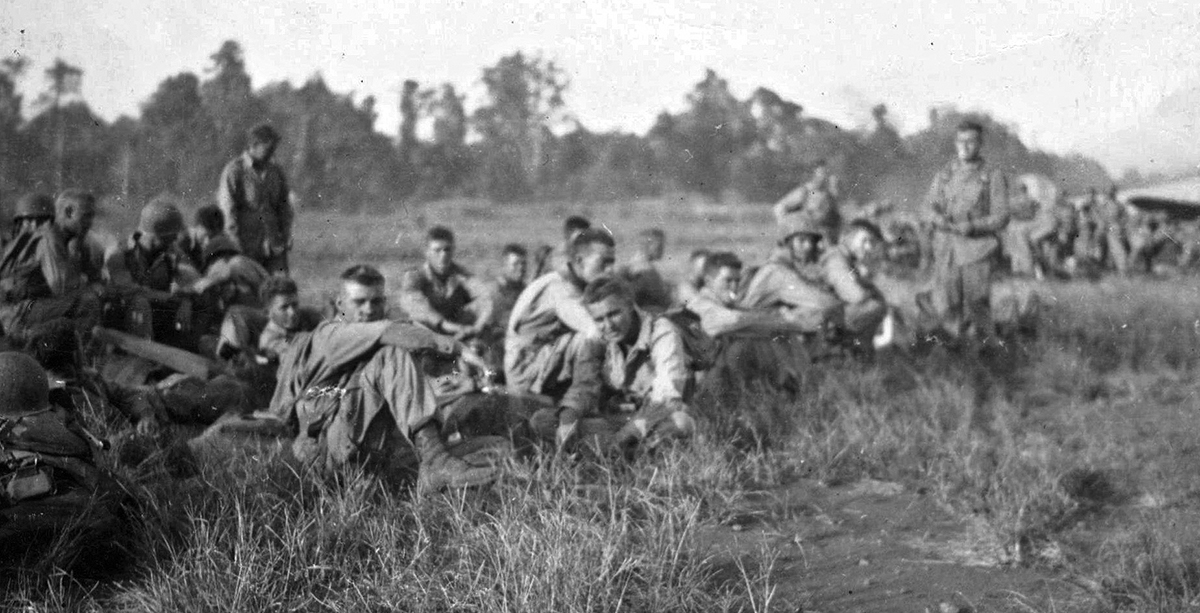 The DUKWs dropped the Angels in a large clearing next to an empty Marston mat-planked runway where Girua Airport is located today, though I have yet to find concrete evidence as to which strip at Dobodura they camped next to. Regardless, at USASOS Base “B” Colonel Haugen's boys plopped down on their helmets to take in the site of the Owen Stanley Range inland to the west. Some anxious non-coms and junior officers yelled at the men to stay out of the tough native kunai grass which was reported to hold insects carrying diseases (the red mite carried Scrub Typhus). As the Angels progressed in their theater training, those same non-coms or junior officers later yelled at their men to stay out of the kunai grass and then yelled again for them to stay off the trails or the clearings where "The Japs will get you!" Numerous frontline 511th troopers asked themselves, "Just where the hell are we supposed to stand?!"
The DUKWs dropped the Angels in a large clearing next to an empty Marston mat-planked runway where Girua Airport is located today, though I have yet to find concrete evidence as to which strip at Dobodura they camped next to. Regardless, at USASOS Base “B” Colonel Haugen's boys plopped down on their helmets to take in the site of the Owen Stanley Range inland to the west. Some anxious non-coms and junior officers yelled at the men to stay out of the tough native kunai grass which was reported to hold insects carrying diseases (the red mite carried Scrub Typhus). As the Angels progressed in their theater training, those same non-coms or junior officers later yelled at their men to stay out of the kunai grass and then yelled again for them to stay off the trails or the clearings where "The Japs will get you!" Numerous frontline 511th troopers asked themselves, "Just where the hell are we supposed to stand?!"
Orders to "Get on your feet!" were soon bellowed and the 511th's companies were led to areas that had been cleared by other Allied units earlier in the island campaign. The Angels spent nearly a month erecting their base of operations from scratch and Hard Rock's paratroopers started with cutting bamboo to set up pyramidal tents, complete with newly issued mosquito netting, with enlisted men camped on one side of a company's road and officers on the other. Given that much of the fighting on the island had moved north, exploring Angels found the jungle and airstrips around them full of discarded building materials left behind by units which had moved on from Dobodura and Buna. This allowed the 511th to fashion all sorts of conveniences for their areas, including showers made from leftover P-38 drop tanks, washing machines from Jeep motors, working radios, washing stations for hygiene and cleaning mess kits, reading rooms with card tables, kitchens for fresh bread and much more.
Division also fashioned a central area to view movies at night or watch softball games or boxing matches provided by boxing teams from the 511th PIR, DivArty (Division Artillery), Special Troops, and the 187th and 188th Glider Infantries.
Unfortunately, in all the initial busyness, too few heeded the command to dig drainage ditches and their tents were flooded out the first time it rained which reminded the Angels that the luxuries of their stateside posts were long gone. In fact, for most of the 511th's young paratroopers, New Guinea was their first taste of foreign shores and quite a few were disappointed that New Guinea was definitely not Hawaii. Dobodura seemed far from anything, with no beachfront bars, no nubile girls in bikinis and the lack of dining establishments was painfully obvious the first time company cooks served Australian Bully Beef and dehydrated potatoes from borrowed Australian Chuck Wagons (the Angels built kitchens and Mess Halls later). The paratroopers quickly perfected the “New Guinea Salute” which involved waving one hand over their mess kit to ward off flies. While the days of fresh food were mostly over (they did catch and kill a hog later), the 511th’s cooks did their best to make palatable meals from dehydrated and canned goods. Service Company’s 2nd Lieutenant Abraham “Moe” Snyder taught those “cooks” to make meat pies from Australian bully beef which became a favorite when supplemented by fresh coconut or bananas.
The Battle of the Bats
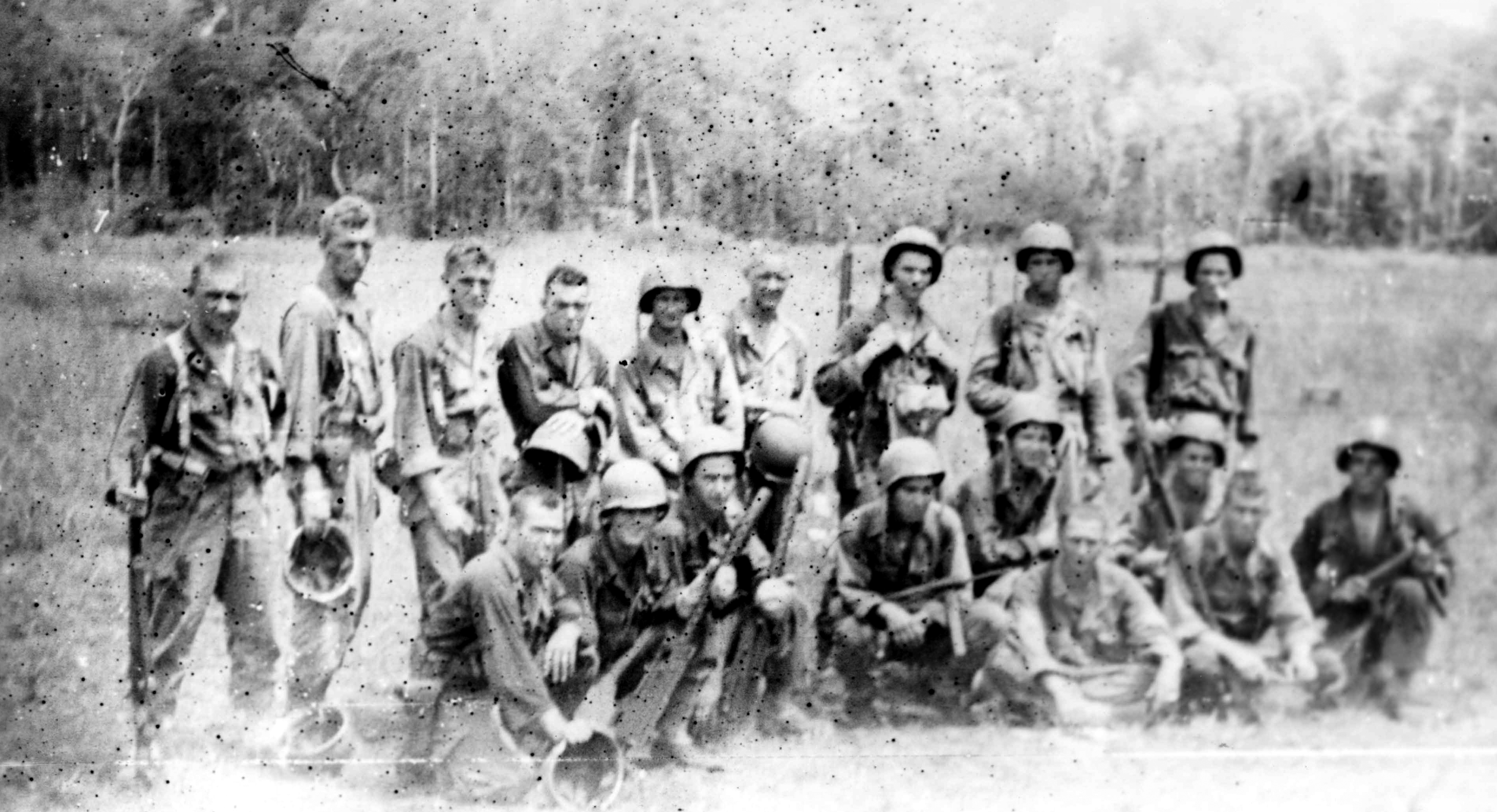 There was one rather humorous occurrence on their second afternoon that definitely needs to be shared. Some troopers in my grandfather's D Company noticed huge bats flying through their still-sparse encampment. Tales had spread onboard their three weeks aboard the Sea Pike that New Guinea was home to vampire bats big enough to grab onto a man and suck his blood through his neck so the worried D Company paratroopers shouldered their rifles for “target practice” which sent hundreds of bats swarming out of the trees. Additional D Company-men soon joined The Battle of the Bats and together they expended “easily 10,000 rounds…” one participant recalled, perhaps with a smile.
There was one rather humorous occurrence on their second afternoon that definitely needs to be shared. Some troopers in my grandfather's D Company noticed huge bats flying through their still-sparse encampment. Tales had spread onboard their three weeks aboard the Sea Pike that New Guinea was home to vampire bats big enough to grab onto a man and suck his blood through his neck so the worried D Company paratroopers shouldered their rifles for “target practice” which sent hundreds of bats swarming out of the trees. Additional D Company-men soon joined The Battle of the Bats and together they expended “easily 10,000 rounds…” one participant recalled, perhaps with a smile.
“The officers descended on the area and with the aid of the non-coms got the shooting stopped,” remembered Corporal Murray Hale with some humor. “We succeeded in wiping out the bat population, but…Colonel (Haugen) gave the orders for our weapons to be taken away and returned to a secure area and kept under lock and key.”
There is some discrepancies in Murray's testimony, as others in D Company said they didn't hit anything. Either way, Sergeant Edwin "Ed" Sorenson recalled, “I suspect that a number of officers sneaked back to their tents chuckling. Admonishments were the order of the day for a week or two.”
Bats were not the only prey hunted on New Guinea, however. While the main fighting had concluded in the area, some Japanese were still hiding in the jungle so Allied forces set up a bounty system wherein native Papuans received payment for every pair of enemy soldiers’ ears they delivered. Over the next few months some Angels joined the locals on these hunts to better learn how to stalk the enemy in the brush and returned with a wealth of helpful knowledge.
Team Haugen - Boxing on New Guinea
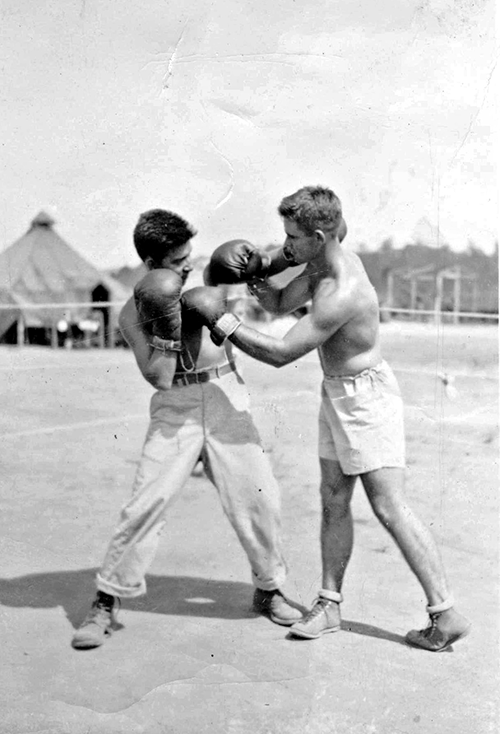 Earlier I mentioned the Angels' penchant for boxing. With their camp now established, the 511th PIR, whose pre-New Guinea boxing record was average at best, quickly became loathed by other units due to its new-found pugilism skills. This change in competition outcomes was due to a frustrated Colonel Haugen telling RHQ’s 1st Lieutenant Foster “Punchy” Arnett to take over coaching the team and to start winning (Arnett obediently won the New Guinea championship).
Earlier I mentioned the Angels' penchant for boxing. With their camp now established, the 511th PIR, whose pre-New Guinea boxing record was average at best, quickly became loathed by other units due to its new-found pugilism skills. This change in competition outcomes was due to a frustrated Colonel Haugen telling RHQ’s 1st Lieutenant Foster “Punchy” Arnett to take over coaching the team and to start winning (Arnett obediently won the New Guinea championship).
Foster had good stock to work with as D Company's Pfcs. Joe Juarez and Bobby Burnside demonstrate in the photo to the right. With Foster's continued coaching, their D Company comrade Pfc. William Dubes quickly learned to use his golden gloves to decimate opponents in the ring. Another great puncher, H Company’s Pfc. Jarrold T. “Jerry” Davis, once knocked a much larger opponent to the floor, twice, before winning decisively. E Company’s Pfc. Calvin “The Red Fox” Lincoln frequently approached opponents with his left hand down before ending the match with his right. Fox Company’s Ted “The Walloper” Morrison just floored opponents and George Company’s Pfc. William P. Ransdell, the rookie of the ring, knocked out two of the Division's Glider Riders with his first two punches as his comrades roared their approval.
Colonel Haugen was pleased with the successes of his boxers, and Lieutenant Foster, who also oversaw the Division Officers Mess, rewarded his champions with steaks taken from the Division Staff’s personal store. Well, until Gen. Swing found out, that is, and irately had Punchy removed, adding, “Keep your damn boxers out of my mess hall.”
It is of note that boxing was only one of the Angels’ many athletic pastimes. The Division Football League (tackle without pads to toughen the men up) consisted of teams from the 511th, 187th and 188th Glider Infantry Regiments and Division Artillery (DivArty). To this day, no one really knows who won the first overly competitive match between the 511th and DivArty at Dobodura, but it was a knock-down, drag-out fight.
The 511th's paratroopers also set up a volleyball nets on company streets and pickup games filled 2nd Battalion’s down time. Even their division commander Major-General Joseph May Swing himself participated and during one oft-recounted experience, a junior officer fresh from the states arrived at Division HQ and was appalled to see so many enlisted men without their uniforms on (New Guinea is humid and hot, after all). The young lieutenant chastised the troopers for being out of uniform and looking so unkempt. General Swing winked at the men around him and said, "Say boys, he's right. Let's get cleaned up." Chuckling, the Angels put on their uniforms and formed up before the clean-cut new arrival who, upon noticing the stars on General Swing's shirt, turned bright red and blubbered out a humble apology.
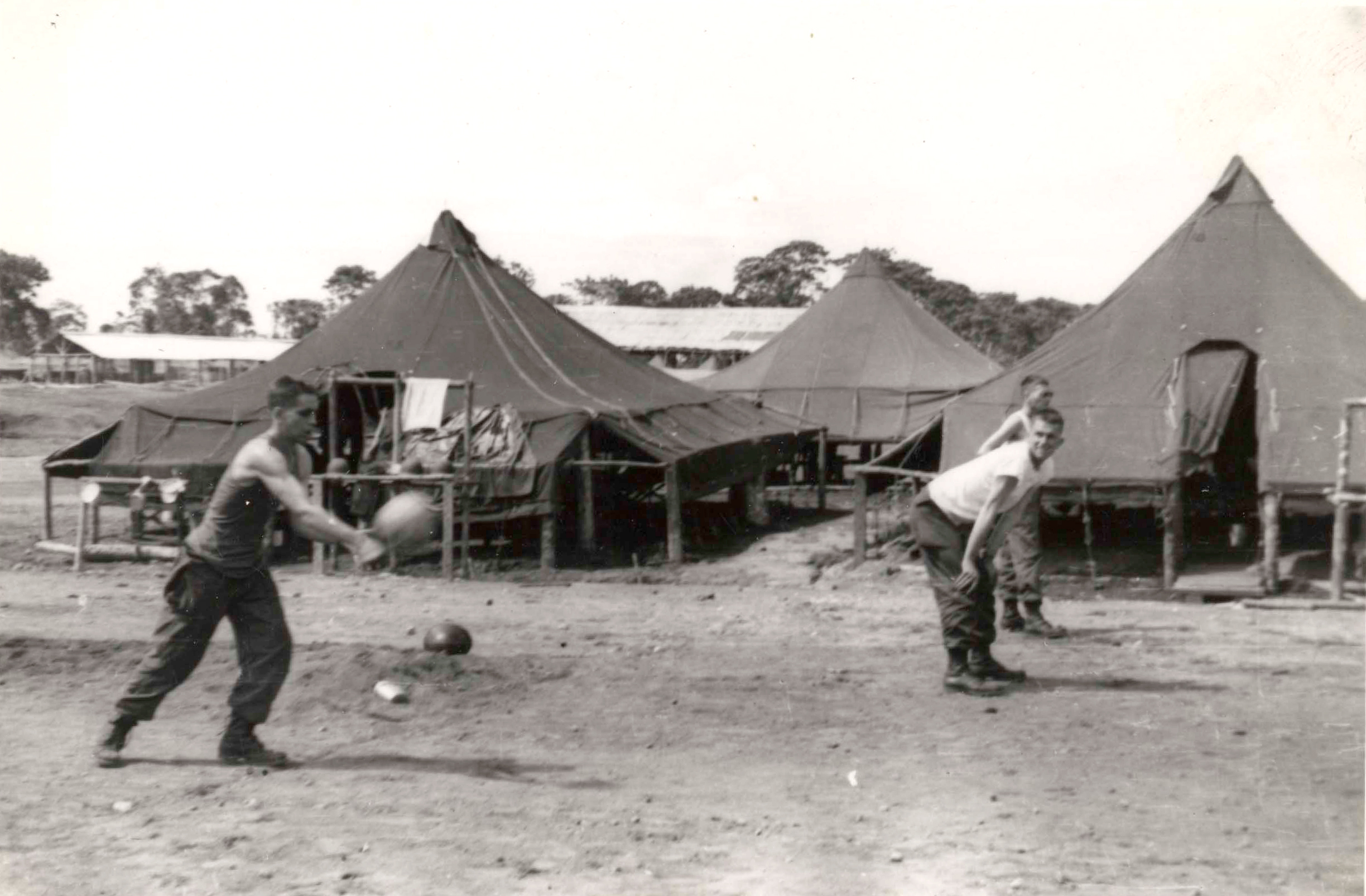 After training all day, or playing ball in the afternoon, the Angels often played games of bridge in the evening to relax and enjoyed refreshing dips in the ocean to cool off. Being in the Pacific, fish were plentiful along the coastal waters and some paratroopers took to tossing in grenades or TNT a la Crocodile Dundee to increase the haul. Dog Company’s Sergeant Ed Sorenson, Corporal Murray Hale and Pfcs. “Chic” Williams and “Red” Zadoorian spent their weekends “fishing” and swimming near a Buna beach shack. One morning Chic went for a swim while the others dozed on the shack’s “porch” when suddenly a large fin broke the water’s surface. Screaming for help, Williams paddled for shore while his scrambling buddies grabbed their rifles and opened fire on the shark. Hitting their mark, the “enemy” was quickly devoured by his own comrades as Chic panted on shore, much to his friends’ relief.
After training all day, or playing ball in the afternoon, the Angels often played games of bridge in the evening to relax and enjoyed refreshing dips in the ocean to cool off. Being in the Pacific, fish were plentiful along the coastal waters and some paratroopers took to tossing in grenades or TNT a la Crocodile Dundee to increase the haul. Dog Company’s Sergeant Ed Sorenson, Corporal Murray Hale and Pfcs. “Chic” Williams and “Red” Zadoorian spent their weekends “fishing” and swimming near a Buna beach shack. One morning Chic went for a swim while the others dozed on the shack’s “porch” when suddenly a large fin broke the water’s surface. Screaming for help, Williams paddled for shore while his scrambling buddies grabbed their rifles and opened fire on the shark. Hitting their mark, the “enemy” was quickly devoured by his own comrades as Chic panted on shore, much to his friends’ relief.
A shark-free deep river also flowed down from the Owen Stanley Range, which provided a delight as some earlier engineering unit had put in a diving board at a twenty-five-foot cliff which the boys of the 511th jumped off as if they hadn’t a care in the world. In many ways, Dobodura was still like summer camp that they had been sent to and there were plenty of antics to match the mindset.
Jungle Juice - The Whiskey Rebellion of Dobodura
Obviously, the Angels' camp at Dobodura was lacking in Officers Clubs and Beer Gardens, although officers were allowed to bring a small amount of alcohol with them across the Pacific. So, given the dearth of available bars, the Angels’ were left with chlorinated drinking water served from lister bags (rubber-lined canvas sacks) which hung on every company “street.” The warm, halazone treated water tasted like rubber and my grandfather's D Company took to mixing in lemon powder just to stand it.
Thirsting for something stronger, Sergeant Ed Sorenson and Pfc. Chic Williams, who survived his afore-mentioned encounter with the shark, purchased a brass still for twenty Australian pounds to augment their rationed 3.2 beer. After negotiating for the required ingredients from the battalion baker (with a promise to share the spoils), the enterprising paratroopers caulked several M1 boxes and barrels for containers then used the tall kunai grass near the hills to hide the still. Ten days later they went to check on their “brewery” and were disappointed to find the contrivance split open.
“(There) was a sea of foam four feet deep and at least thirty feet wide,” lamented Ed. “Chic was from Boston and failed to take into consideration the difference in temperature...”
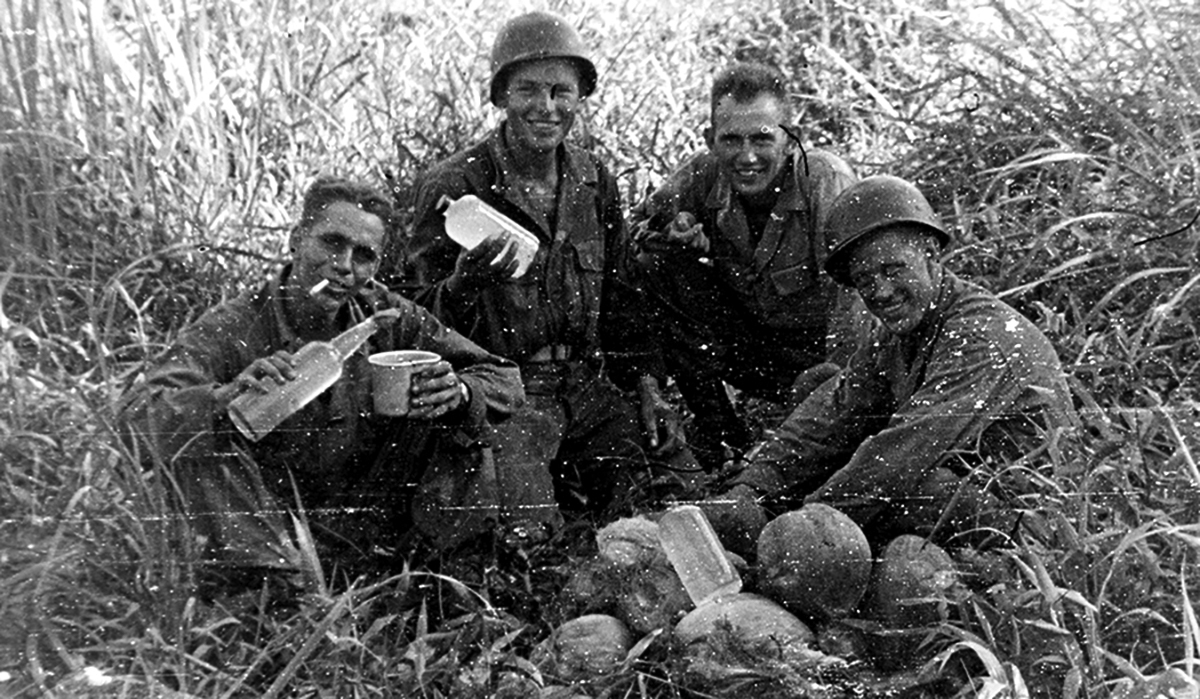 Several others in the regiment found ways to create their own “Jungle Juice” or “White Lightening” during The Whiskey Rebellion of Dobodura, and not always to their benefit. One evening 2nd Battalion surgeon Captain Matthew Platt encountered D Company’s Corporal William Walter and Pfc. William Dubes pulling their blasted buddy “Gemo” on a Jerry Can cart to wheel him out to his guard post. Fired up, Captain Platt shared several colorful words with the trio about the dangers of their beverage choices with stern reminders that they were in-theater now.
Several others in the regiment found ways to create their own “Jungle Juice” or “White Lightening” during The Whiskey Rebellion of Dobodura, and not always to their benefit. One evening 2nd Battalion surgeon Captain Matthew Platt encountered D Company’s Corporal William Walter and Pfc. William Dubes pulling their blasted buddy “Gemo” on a Jerry Can cart to wheel him out to his guard post. Fired up, Captain Platt shared several colorful words with the trio about the dangers of their beverage choices with stern reminders that they were in-theater now.
The 511th's Whisky Rebellion continued when soldiers from the division’s 408th Airborne Quartermaster Company tried to sell unauthorized beer rations to the 511th at inflated prices. The angry paratroopers booted them out of their bivouac then jumped the quartermaster troops “Robin Hood-style” along a jungle road and relieved them of their questionably obtained alcohol before sharing the booty amongst the regiment like true heroes. Angels indeed.
One non-alcoholic favorite the paratroopers enjoyed nightly was a homemade hot chocolate made by heating Eagle Brand Condensed Milk and mixing in chocolate bars. It was a delicious treat that brought a feeling of home which felt very far away at times.
One New Guinea unpleasantry that even the hot chocolate could not help with was the insect powder that combined with the Angels’ sweat to create an uncomfortably messy compound. The paratroopers also used insect repellant to fend off the island’s mosquitos which some in D Company swore were big enough to shoot down with AA-guns.
As an additional preventative health measure, beverages of all sorts were used to swallow their daily anti-malarial Atabrine pills under the watchful eyes of the medics (some troopers feared the pills would make them sterile). The medicine’s main ingredient, quinacrine (quinine was in short supply after Japan conquered Java), was believed to help ward off malaria, a real threat to soldiers in the Pacific. Atabrine had one very noticeable side effect, however.
“We turned yellow in complexion and in the eyes,” remembered Cpl. Murray Hale. “But it worked!”
Actually, it didn’t as the troopers later discovered, some not until after the war. Atabrine only suppresses, not prevents, malaria’s symptoms, since the drug kills parasites in the bloodstream, but not the liver.
The Battle of Cape Sudest
The 11th Airborne enjoyed a large 4th of July celebration that included special explosives, flares and tracer shells, but the next day it was back to work. Jungle training was emphasized as the Angels ran battalion and company tactical problems in the surrounding hills during which they memorized the settings around the Kokoda Trail, including the Buna and Gona swamps and the Ambogo and Sambogo Rivers (I will cover their theater training in greater detail in Part 2).
The 511th’s 3rd Battalion certainly put their jungle infiltration training to the utmost when they penetrated the Women’s Auxiliary Army Corps housing five miles away on Cape Sudest, despite the vigilant M.P.s, machine gun nests, fences, and a moat on one side which Colonel Haugen's troopers only saw as a challenge. When 2nd and 1st Battalions learned of 3rd Battalion’s success, unauthorized visits to the WAAC compound exploded. In their defense, the enlisted men argued, the only other way to get a date with a WAAC was with a commission, a jeep and a pistol at your side.
After the war they joked that the only action they saw on New Guinea was during “The Battle of Cape Sudest”.
Ali Swing’s Angels and Thieves
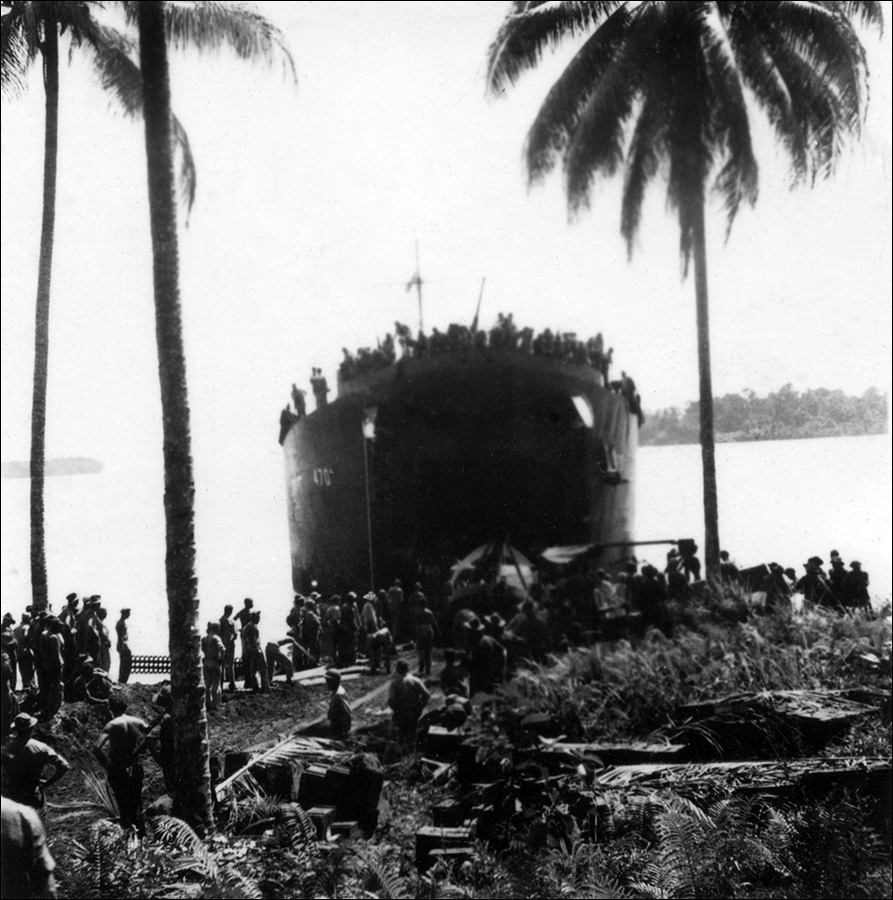 One of the paratroopers’ least enjoyable tasks on New Guinea was unloading ships in Oro Bay (they also hated working in the munition dumps and motor pools that they had passed in the DUKWs on their first day). With a lack of service troops in the area, even the mighty 11th Airborne had to lend a hand and the 511th’s paratroopers made sure they were paid for their services by appropriating whatever items they deemed “necessary”. Everything from jeeps to canned turkeys, M7 grenade launchers to cases of ammunition were fair game and whenever offended supply officers came looking, the Angels claimed innocence and used their jungle training to hide the contraband in the brush or under their tents.
One of the paratroopers’ least enjoyable tasks on New Guinea was unloading ships in Oro Bay (they also hated working in the munition dumps and motor pools that they had passed in the DUKWs on their first day). With a lack of service troops in the area, even the mighty 11th Airborne had to lend a hand and the 511th’s paratroopers made sure they were paid for their services by appropriating whatever items they deemed “necessary”. Everything from jeeps to canned turkeys, M7 grenade launchers to cases of ammunition were fair game and whenever offended supply officers came looking, the Angels claimed innocence and used their jungle training to hide the contraband in the brush or under their tents.
“General Swing, when approached about it (by the port commander), supposedly said, ‘It couldn’t have been my boys. They are perfect angels…’” Grandpa/1LT Carrico remembered with a chuckle. Division lore partially attributes Swing’s reply to their nickname “The Angels”.
“It wasn’t true,” Grandpa declared. “They stole everything they could get their hands on.” This included the Oro Bay generator which kept the docks well-lit compared to the Angels’ Coleman lanterns. One night an unnamed “squad” from the 511th (everyone swore secrecy) infiltrated the dock, cut the wires and trucked the generator back to camp. The next evening the regiment’s area was lit up “like Times Square.” Unfortunately, about a week later the generator was ordered moved to Gen. Swing’s CP (RHIP), but eventually Oro Bay’s angry base commander sent men to retrieve the generator from “Ali Swing and his 8,000 Thieves.”
While unloading a ship offshore, one such “thief” D-511’s Pfc. John H. “Bad Soldier” Bittorie of Boston came across a box clearly marked for the regiment’s priest. It was also labeled “altar wine” so John hid the box until after chow when he and his buddies opened one of the six bottles while relaxing on the dock.
“We drank it over time,” Cpl. Murray Hale remembered. “And I think we each confessed to ourselves it wasn’t the right thing to do. We didn’t feel any holier, anyway.”
Cpt. Stephen Cavanaugh said Bittorie was “an Irish lad who loved to fight and had a reputation in the outfit for being a good guy but frequently at odds with authority. A few months later I recommended this ‘bad soldier’ for a Silver Star.”
Sgt. Ed Sorenson clarified that many Angels, not just Bittorie, were constantly stealing as “the bad food (on New Guinea) spawned some excursions that were masterpieces of fairly good planning and outstanding good luck. To my knowledge, no one’s conscience ever suffered.”
During these “moonlight requisition” trips, the paratroopers used their infiltration skills to sneak into the camps of nearby Australian units and pilfer their stores. While their butter was compared to Motor Oil No. 2, the Angels came to appreciate the Aussies’ canned goods including turkey, milk and fruit. Loaded down with their procured wares, the paratroopers then walked along the road until a a pre-arranged truck came by for their bartered ride back to camp.
“Stealing was a way of life,” noted D Company’s “Mailman” Cpl. William Walter.
“We buried our booty in our tents under the flooring so instead of a steady diet of field rations, when we were out on field problems, we had a little variety to take along,” explained Sgt. Murray Hale.
Dog Company was hardly the only culprits and How Company became renowned for its “Black Market” of seized goods for sale or trade. 3rd Battalion’s LTC Ed Lahti noted dryly, “It seemed that H Co. performed over and above the line of duty in any endeavor they undertook.”
One highly valued item for the enlisted men were .45 pistols which they had been issued until their movement from Camp Polk when the practice stopped, a decision they greatly disagreed with given the close-quarter nature of warfare with the Japanese. Called “the Fox Hole Comforter” by Col. Haugen’s men, it was not uncommon for entire crates of pistols, and magazines, to go missing.
Similarly, transportation was a problem the Angels took to solving their own way. Cpl. Walter remembered, “Stealing Jeeps was another occupational pastime. We would filch one to ride around to see buddies in other units.”
Paratroopers often carried distributor cap rotors in their pockets (MPs removed them from Jeeps to prevent theft) when visiting other units. Air Corps personnel had a veritable fleet of Jeeps to get around, so the Angels relieved the flyers of several. It was said that by the time the 11th Airborne left New Guinea, the jungles around Dobodura resembled a parking lot of stolen Jeeps, trucks and transports, including one DUKW stolen on a lark by Cpl. Walter and Pfc. Clyde T. Johnson. “I don’t know why I did that,” Willie said with a laugh.
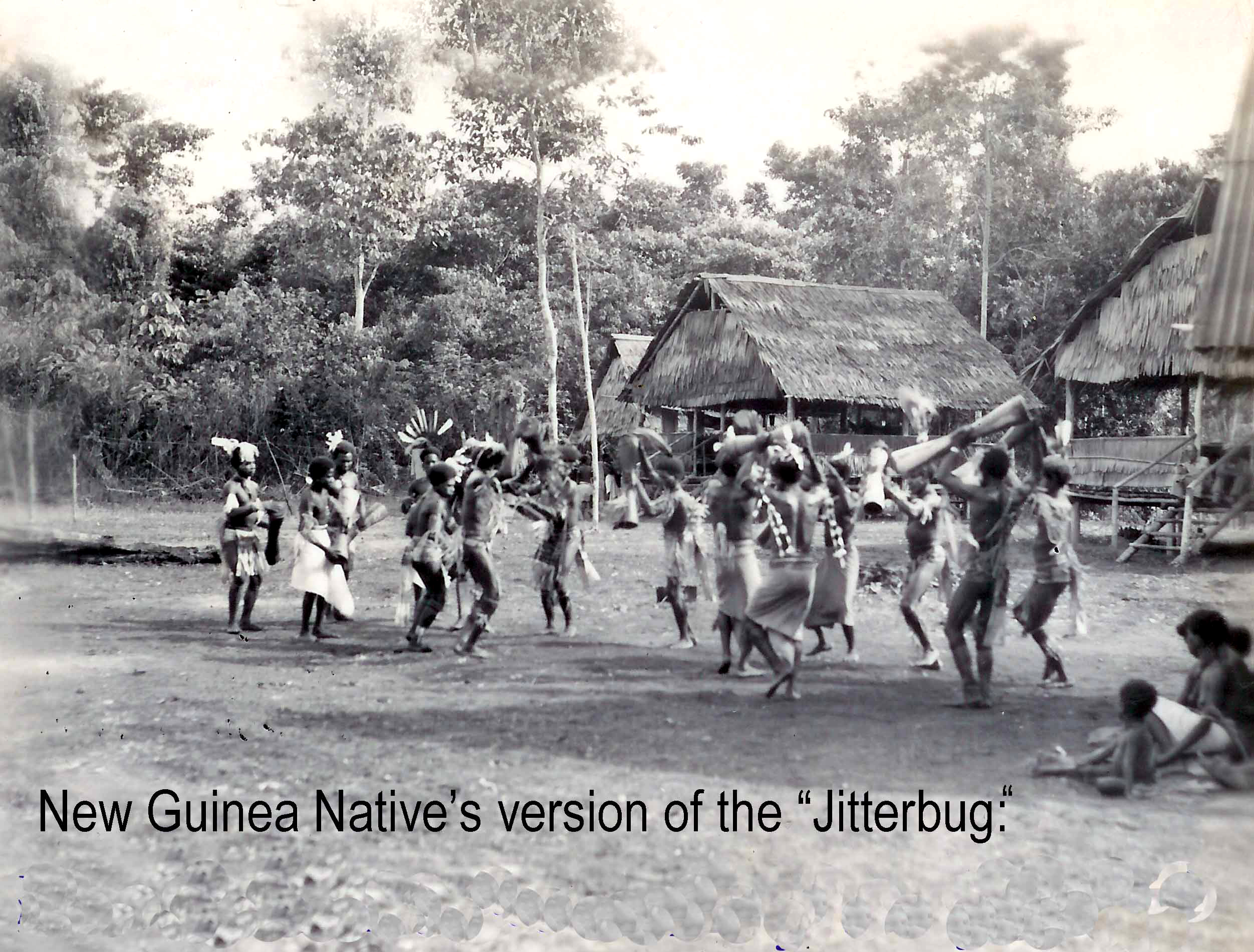 Perhaps in an attempt to calm the mischief, the division’s engineers worked with local Papuans, whom the Angels called “Fuzzy Wuzzies”, to build a large chapel without using a single nail. It was a feat of construction that left many troopers amazed. The tribe then put on a special show for the Americans that included traditional dances, music and singing. Not that the Angels got too close.
Perhaps in an attempt to calm the mischief, the division’s engineers worked with local Papuans, whom the Angels called “Fuzzy Wuzzies”, to build a large chapel without using a single nail. It was a feat of construction that left many troopers amazed. The tribe then put on a special show for the Americans that included traditional dances, music and singing. Not that the Angels got too close.
The Angels were regularly told to stay away from The Two G’s: gardens and girls and Cpl. Walter noted, “We soldiers, for the most part, had no trouble obeying that command.”
“You couldn’t go near them because of the smell,” Grandpa said with a grimace. “I don’t think they ever took a bath.”
Burn Duty
Another odor problem came from the latrines which consisted of three fuel drums stacked with a wooden top, a layout that 3rd Battalion’s LTC Ed Lahti said “didn’t encourage you to ‘sit and think’…”
Companies took turns on “burn duty” and one day D Company’s S/Sgt. Murray Perlman watched South Dakota’s Pvt. Warren E. Milbrandt fill the latrines with gasoline then toss in a match. The resulting fireball burned off Warren’s eyelashes and eyebrows and Murray roared with laughter.
The New Guinea Phantom
 Rumors began to circulate through the 511th that an island monster was decapitating men left and right (though no dead were ever reported). Some believed it was the ghost of a dead Japanese pilot as split-toed footprints were found throughout camp (one prankster later admitted to using abandoned Japanese footwear to increase the scare).
Rumors began to circulate through the 511th that an island monster was decapitating men left and right (though no dead were ever reported). Some believed it was the ghost of a dead Japanese pilot as split-toed footprints were found throughout camp (one prankster later admitted to using abandoned Japanese footwear to increase the scare).
Angels took to sleeping with bayonets under their pillows while each company stationed guards from dusk to dawn until one night a commotion filled RHQ’s area and Col. Haugen shouted, “Evacuate! There he goes! Get out!” Minutes later a group of troopers led a native Papuan out of a tent where he had been trying to steal supplies. “The Thing” or “The Phantom” turned out to be a poor Fuzzy Wuzzy who had been banished by his tribe for some offense and the sympathetic Angels fed and turned him loose.
I think we'll leave the Angels on New Guinea there for a time while I work on Part 2 that will cover the depth of their theater training which helped prepare the 511th PIR, and the 11th Airborne Division as a whole, for their bloody campaigns on Leyte and Luzon. If you have any feedback or comments on these posts, please feel free to email me using our website's contact form located here. We are always interested in hearing from the families of Angels, regardless of which unit they were in, and are always adding photos, letters and veteran interviews to the website, so stay tuned!
Airborne All The Way.
-Jeremy C. Holm
www.511.pir
To learn more about the 11th Airborne Division in World War II, please consider purchasing a copy of our books on the Angels:
